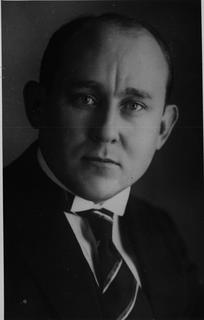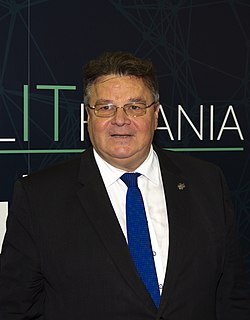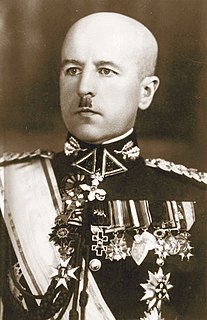 W
WLeonas Bistras was one of the most prominent Lithuanian politicians of the interwar period. A Christian Democrat, he rose to the peak of his career in 1925, when he was appointed as the Prime Minister of Lithuania. Bistras also headed the ministries of education, defense and foreign affairs in several different governments throughout 1920s and 1930s and twice served as the speaker of the Lithuanian parliament, the Seimas. After the 1926 Lithuanian coup d'état and the subsequent fall of parliamentary democracy, Bistras led the Christian Democrats and, despite persecution, acted as an outspoken leader of the opposition to the authoritarian President Antanas Smetona.
 W
WAudrius Butkevičius is a Lithuanian politician, a signatory of the Act of the Re-Establishment of the State of Lithuania, member of the Seimas from 25 November 1996 till 18 October 2000. He does not belong to any party.
 W
WTeodoras Daukantas was a Lithuanian military officer who served as Lithuanian Minister of Defense. In 1903–1918, Daukantas served in the Imperial Russian Navy. He attended Naval Training School at St. Petersburg (1903–1906). In 1911–1914, Daukantas attended High Naval Training School at St. Petersburg from which he graduated with a Silver Star in Naval Tactics Training. In 1913, he published The Defense of Abu-Alaud and in 1916, Essays on Naval Tactics. Later he published the articles "The Defense of Coasts", "The War on Rivers". He published the books The South of Brazil and Our Way to Vilnius. After World War I, Daukantas returned to Lithuania in 1922. He was head of education section of the Senior Officers Academy in Kaunas until 1924. Twice, in 1924–1925 and 1927–1928, he served as the Lithuanian Minister of Defense.In between serving as the Lithuanian Minister of Defense, he was the Chief of the General Staff of the Lithuanian Army. In his diary for 1927, American diplomat Robert Heingartner who served in Lithuania recorded that "Colonel Daukantas is said to be so powerful in the army that no government could last a day without his support." In 1928, he was promoted to brigadier general.
 W
WRasa Juknevičienė is a Lithuanian politician and paediatrician who has been serving as a Member of the European Parliament since 2019. She served as Minister of Defense of Lithuania since 2008 to 2012. She is a member of center right Homeland Union.
 W
WRaimundas Karoblis is a Lithuanian politician. As of 13 December 2016, he serves as Minister of Defence in the Skvernelis Cabinet led by Saulius Skvernelis.
 W
WGediminas Kirkilas is a Lithuanian politician who was Prime Minister of Lithuania from 2006 to 2008. He was confirmed by the Seimas on 4 July 2006 after Zigmantas Balčytis, the provisional Prime Minister, failed to gather the required support from the parliament. He stepped down on 27 November 2008 after the 2008 parliamentary elections, and gave way to Andrius Kubilius to start his term as the prime minister.
 W
WLinas Antanas Linkevičius is a Lithuanian politician of the Social Democratic Labour Party.
 W
WAntanas Merkys was the last Prime Minister of independent Lithuania, serving from November 1939 to June 1940. When the Soviet Union presented an ultimatum to Lithuania demanding that it accept a Soviet garrison, President Antanas Smetona fled the country leaving Merkys as acting president. Merkys ostensibly cooperated with the Soviets, and illegally took over the presidency in his own right. After three days, Merkys handed power to Justas Paleckis, who formed the People's Government of Lithuania. When Merkys attempted to flee the country, he was captured and deported to the interior of Russia, where he died in 1955.
 W
WJuozas Olekas is a Lithuanian surgeon and politician, a former Minister of National Defence, from 2006 to 2008. In 1990 and from 2003 to 2004 he also served as the Health Minister. In 2019 he was elected to the European Parliament.
 W
WStasys Raštikis was a Lithuanian military officer, ultimately obtaining the rank of divisional general. He was the commander of the Lithuanian Army from September 21, 1934 to April 23, 1940.
 W
WBaron Stasys Šilingas was a prominent lawyer and statesman in interwar Lithuania.
 W
WČeslovas Vytautas Stankevičius is a Lithuanian politician. In 1990 he was among those who signed the Act of the Re-Establishment of the State of Lithuania.
 W
WVincas Vitkauskas was a Lithuanian general. He became commander of the Lithuanian Army after the resignation of Stasys Raštikis in January 1940. In this capacity, Vitkauskas opposed armed resistance to the Soviet occupation in June 1940 and subsequently collaborated with the new Soviet regime.
 W
WAugustinas Voldemaras was a Lithuanian nationalist political figure. He briefly served as the country's first prime minister in 1918 and continued serving as the minister of foreign affairs until 1920, representing the fledgling Lithuanian state at the Versailles Peace Conference and the League of Nations. After some time in academia, Voldemaras returned to politics in 1926, when he was elected to the Third Seimas.
 W
WSilvestras Žukauskas was a general in the Russian army, and later in his native Lithuania, after it regained its independence in 1918.